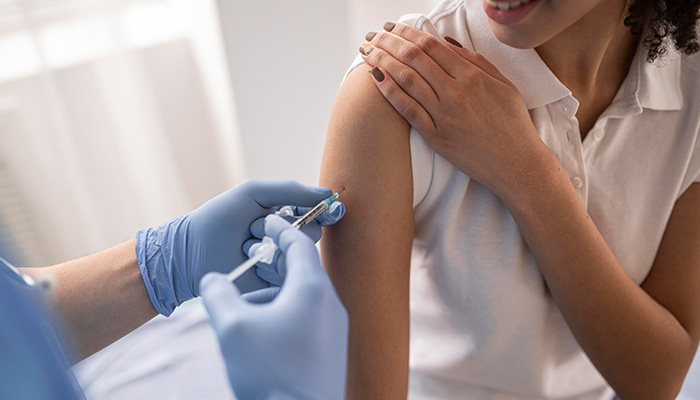Your son is not like other children. He gets a runny nose, congestion, sneezing, itchy eyes, and itching in the ears whenever he goes out in the evening, or when the house is dusted and cleaned, or when he plays with the neighbors pet. You know that your child is allergic to pollen, and dust mites. You are also aware of the fact that avoiding exposure to these allergens is not a practical solution for it. So, how do you help your child lead a normal life like other children of his age? You may try getting your child an allergy shot!
If environmental control measures and treatment with basic allergy medications have not worked for you, you may consider allergy shots for relief from your allergies. Agreed that getting regular shots isn’t anyone’s idea of fun, but the possibility of being free from your allergy symptoms may be worth the effort.
Shots for your immune system
You develop an allergic reaction when your immune system interprets an allergen/ external substance that your body is exposed to as a foreign invader. The unusual response to the allergen by the immune system is reason for the allergy symptoms.
Allergy shots are an effective treatment for allergies that aim to reduce sensitivity to allergens. Allergy shots work by turning down your immune system which is the main source of all the allergic reactions. Like vaccines, they contain a small amount (just enough to stimulate your immune system) of the substance or substances that triggers your allergic reactions. Once you get the allergy shots, your body’s immune system makes antibodies against the allergen contained in the shot. Next time when you come in contact with the allergen, these antibodies help in blocking its effect. As the dose of allergens is increased in each of your subsequent allergy shots, your body gets used to the allergens. Your immune system develops tolerance to the allergens and causes a reduction in the severity of your allergy symptoms over time. You may also start feeling relieved of your symptoms after many allergy shots.
You can be treated with allergy shots if you have allergy to pollen, insect sting, drugs, dust mites, or pet dander. It is also useful if you have mild to moderate allergic asthma. However these shots have not proven to be effective if you have hives or food allergies.
Allergy shots are not for everyone
Not everyone is a suitable candidate for getting allergy shots. You cannot take allergy shots if you suffer from severe asthma, have heart ailments, or are on drugs such as beta blockers prescribed for heart problems. If your child is less than 5 years he/she should not be given allergy shots. Also, if you conceive while you are on the shots or plan to start a family, you may need to consult your doctor whether continuing the shots are safe for you.
Find out more about allergy shots
Before you are given the allergy shots your physician will want you to undergo an allergy test. In the allergy skin test, your doctor will put tiny amounts of allergens on your skin to see which ones you react to. There are blood tests also, which include Radioallergosorbent test or the Immunocap test. These tests will help your physician to determine and identify the exact cause of your allergy symptoms.
You should not exercise or engage in vigorous activity for two hours before and after your appointment, as this stimulates increased blood flow to the tissues and promotes faster release of antigens (that trigger the allergic reaction) into the bloodstream.
Your physician will initiate treatment with shots administered 1 to 2 times (given on the upper arm) every week for the first six months. After 6 months, your physician will decide if you can go on maintenance treatment. Shots are given once every two to four weeks as part of the maintenance phase for the next 3 to 5 years. Once you stop taking the shots you may continue to derive benefit for 5 to 10 years or longer. However, your allergy symptoms may return more quickly if you stop taking the shots prior to a total of 3 years.
Once you start getting the shots it may be about 6 months or more before you start feeling better and notice relief from your allergy symptoms. If there is no improvement in symptoms after a year of receiving shots your physician may suggest that you consider other alternative treatments for your allergies.
Safety of the shots
It is very unlikely that you will develop any harmful effects to the allergy shots. However, since the allergy shots contain the allergen there is a possibility of you having an allergic reaction to the shot itself. So as a routine practice, you will be monitored at your doctor’s office for about 30 minutes after receiving an allergy shot as most reactions occur during this time.
You may develop redness, swelling, or irritation within one inch of the site of the injection. This reaction is not a matter of concern, and usually goes away within 4 to 8 hours of receiving the shots. There is no need for change in treatment unless you develop a large swelling that requires adjustment of the dosage or frequency of the shots. Few severe reactions to the shots can present as cough, chest tightness, wheezing, throat tightness, shock and can be life-threatening in rare cases. These reactions can be easily reversed with medicines such as injectable epinephrine and anti-histamines. Taking your shots regularly as per the schedule can to some extent reduce your risk of severe reactions.
Feel better, live better!!!
Allergy shots are considered the most effective alternatives in management of allergies when medications fail to adequately control allergy symptoms and avoidance of the trigger is not easy or possible. Unlike allergy medicines, which act only to “cover up” allergic symptoms or prevent them temporarily, allergy shots fix the underlying problem of allergies. They increase your tolerance to allergens that trigger symptoms every time you are exposed to them. About 80 to 90 percent of patients have less or complete resolution of symptoms after getting the shots. Since reactions to the shots are possible, it is better to be aware of the symptoms and contact your doctor immediately for medical attention.




